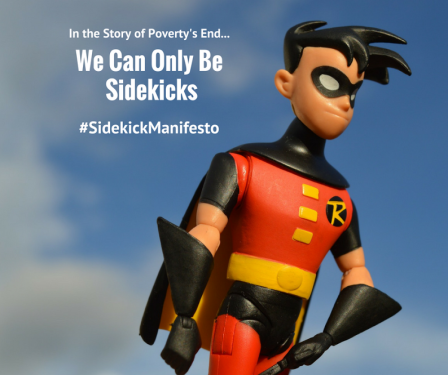
GUEST AUTHOR: Shawn Humphrey
“Here’s your check and there’s the parking lot.” That’s how one civically-engaged college campus community responded to my talk on global poverty.
Ouch. It stung. And, on my lonely walk back to the parking lot, I tried to figure out why:
- Was it the title (Do-Goodernomics)?
- Should I have used the hand sweep?
- Did I bust one too many deeply held do-gooder myths?
But, while I was giving a poorly received talk on poverty, TOMS was (mis)educating tens of thousands of ten year olds on their role in ending poverty with its most recent and predictably distorted marketing campaign.
I was dispirited.
Driving up and down highway 95 talking to college students was not getting me any closer to fundamentally and sustainably changing how our culture interacts, communicates, and articulates its relationships with those it deems to be materially poor.
I needed a concise statement of the things I had learned from my dissertation advisor Douglass C. North and bloggers like Jennifer, J, Tobias, Owen, Duncan, AidLeap, Linda, Daniela, Tom, and Dave.
I needed a distillation of the lessons I had learned with and from my students while running the Global Two Dollar Challenge and our micro finance institution in Honduras (La Ceiba). Namely, local leaders with local solutions to local problems will end poverty. We will not. In the story of poverty’s end, we can only be sidekicks.
So, I wrote the Sidekick Manifesto.
I wrote it to remind myself of my very limited role in ending global poverty. I also wrote it to share with others like billionaire philanthropists, British Prime Ministers, and Ivy League economists randomizing communities into treatment and control groups.
Poverty is about power, politics, and a system of rules that allows so few to capture so many of the benefits of economic prosperity. Poverty is human-made. And, it can be unmade by humans. That includes you and me. That is, if we choose to take up the task as Sidekicks.
I invite you to read the Sidekick Manifesto. If you agree, consider taking the Sidekick Pledge. And, if you are so inclined, help spread the word about the Sidekick Manifesto:
1. Share the Manifesto with colleagues, classmates, family and friends.
2. Post a copy of the Sidekick Manifesto on your office door or dorm room wall.
3. Give a copy of the Sidekick Manifesto to your Student Activities and Study Abroad Directors.
4. Host a Sidekick Manifesto discussion with your students or Non-profit Board of Directors.
5. Post the Sidekick Manifesto on your blog and ask your community to comment.
6. Ask your political representatives to take the Sidekick Pledge.
Thanks

 Trump’s triumph has left the world shocked. His win leaves us with more questions than answers thanks to his campaign being almost entirely devoid of solid policy. So what are the key questions for aid workers?
Trump’s triumph has left the world shocked. His win leaves us with more questions than answers thanks to his campaign being almost entirely devoid of solid policy. So what are the key questions for aid workers?